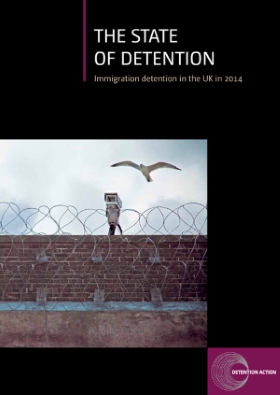Detention Action releases in-depth report which seeks to understand the key problems of the detention system
Detention Action yesterday released an in-depth new report looking at the use of detention for immigration purposes in the UK.
You can read the 44-page The State of Detention report here.
 The group, which campaigns and lobbies for an end to indefinite detention and the Detained Fast Track asylum process, says the use of detention for immigration purpose has expanded too fast, and checks and scrutiny are lacking.
The group, which campaigns and lobbies for an end to indefinite detention and the Detained Fast Track asylum process, says the use of detention for immigration purpose has expanded too fast, and checks and scrutiny are lacking.
The report seeks to understand the key problems of the detention system.
Detention Action says the UK is the only country in Europe which detains migrants indefinitely.
The report says of detained migrants: "They are locked up for months or years, yet unlike prisoners they do not know when they will be released – their detention is without time limit. Indefinite immigration detention has attracted only a fraction of the scrutiny of the pre-trial detention of terror suspects, yet nowhere else in our society are people locked up with so few safeguards. To such little purpose, too, since most migrants detained for long periods are eventually released back into the UK."
Detention Action also says that the UK is also the only country in Europe routinely detaining migrants in prisons.
While migrants in Immigration Removal Centres have many rights denied to prisoners, those detained in prisons are arbitrarily denied these relative privileges.
"Detained in prison, they cannot access the internet to research their case, email contacts or be called by their solicitor. Many do not even have an immigration solicitor, or any idea of how to get one. We have met people in prison who do not even know what an immigration solicitor is," the report states.
Detention Action says that political priorities to detain and deport have overridden practical considerations of effectiveness, as well as basic concern for the people detained.
In chapter 4 of the report, Detention Actions examines alternatives to detaining migrants, and says it is hoped that the evidence and learning from its new Community Support Project will influence the development of wider alternatives to detention by both government and civil society, as well as enabling a shift in policy away from indefinite detention.
Detention Action says that the scale of the crisis is forcing detention up the political agenda: "For the first time, the detention of adults is starting to become a political priority, in Parliament and in civil society. There is now abundant evidence that detention doesn't work."
The group says that while its views on detention may not be objective, it understands detention, and it hopes that its report can serve as both a guide to the evidence and a tool for change.